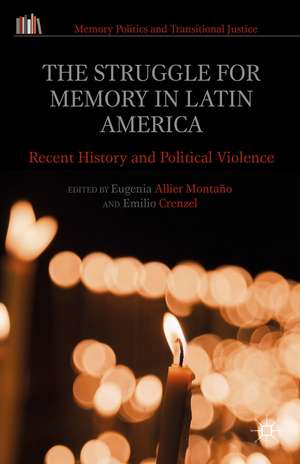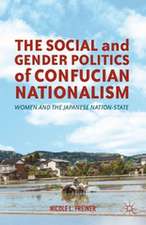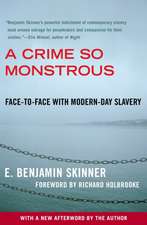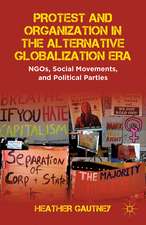The Struggle for Memory in Latin America: Recent History and Political Violence: Memory Politics and Transitional Justice
Editat de Eugenia Allier-Montaño, Emilio Crenzelen Limba Engleză Hardback – 4 iun 2015
Din seria Memory Politics and Transitional Justice
- 15%
 Preț: 579.52 lei
Preț: 579.52 lei - 20%
 Preț: 691.19 lei
Preț: 691.19 lei - 15%
 Preț: 588.50 lei
Preț: 588.50 lei -
 Preț: 386.99 lei
Preț: 386.99 lei -
 Preț: 387.75 lei
Preț: 387.75 lei -
 Preț: 384.86 lei
Preț: 384.86 lei -
 Preț: 383.71 lei
Preț: 383.71 lei - 18%
 Preț: 789.98 lei
Preț: 789.98 lei - 15%
 Preț: 693.90 lei
Preț: 693.90 lei - 15%
 Preț: 698.80 lei
Preț: 698.80 lei - 18%
 Preț: 727.00 lei
Preț: 727.00 lei - 18%
 Preț: 779.26 lei
Preț: 779.26 lei - 18%
 Preț: 889.43 lei
Preț: 889.43 lei -
 Preț: 453.21 lei
Preț: 453.21 lei - 15%
 Preț: 691.91 lei
Preț: 691.91 lei -
 Preț: 416.71 lei
Preț: 416.71 lei - 18%
 Preț: 729.68 lei
Preț: 729.68 lei -
 Preț: 417.68 lei
Preț: 417.68 lei -
 Preț: 447.99 lei
Preț: 447.99 lei -
 Preț: 484.47 lei
Preț: 484.47 lei - 18%
 Preț: 732.40 lei
Preț: 732.40 lei
Preț: 782.72 lei
Preț vechi: 954.54 lei
-18% Nou
Puncte Express: 1174
Preț estimativ în valută:
149.79€ • 162.65$ • 125.82£
149.79€ • 162.65$ • 125.82£
Carte tipărită la comandă
Livrare economică 22 aprilie-06 mai
Preluare comenzi: 021 569.72.76
Specificații
ISBN-13: 9781137514486
ISBN-10: 1137514485
Pagini: 260
Ilustrații: VIII, 260 p.
Dimensiuni: 140 x 216 x 16 mm
Greutate: 0.46 kg
Ediția:2015
Editura: Palgrave Macmillan US
Colecția Palgrave Macmillan
Seria Memory Politics and Transitional Justice
Locul publicării:New York, United States
ISBN-10: 1137514485
Pagini: 260
Ilustrații: VIII, 260 p.
Dimensiuni: 140 x 216 x 16 mm
Greutate: 0.46 kg
Ediția:2015
Editura: Palgrave Macmillan US
Colecția Palgrave Macmillan
Seria Memory Politics and Transitional Justice
Locul publicării:New York, United States
Cuprins
Table of Contents Acknowledgements List of Contributors 1. Introduction; Emilio Crenzel and Eugenia Allier Montaño 2. Dictatorships and Authoritarian Regimes 3. Toward a History of the Memory of Political Violence and the Disappeared in Argentina; Emilio Crenzel 4. As an unhealed wound': Memory and Justice in Post-Dictatorship Uruguay; Eugenia Allier y Camilo Vicente 5. Memory Policies in Chile, 1973-2010; Claudio Barrientos 6. The Skirmish of Memories and Political Violence in Dictatorial Brazil; Samantha Quadrat (Universidade Federal Fluminense, Brazil) 7. The Legacy of Authoritarianism and the Construction of Historical Memory in Post-Stroessner Paraguay; Luis Roniger, Leonardo Senkman and María Antonia Sánchez 8. Wars and Authoritarian Regimes 9. The Truth Ten Years On: The CVR in Peru; Cynthia Milton 10. The Commissions for the Study of Violence in Colombia. An Analysis of the Official Devices and Narratives of the Past and Present of Violence; Jefferson Jaramillo 11. The Limits of Peace in the Case of El Salvador: Memories in Conflict and Permanent Victims; Eduardo Rey Tristán, Alberto Martín and Jorge Juárez Ávila 12. The Naturalization of War and Peace: The Dominant Discourses on Political Violence in Guatemala; Julieta Rostica 13. From Conspiracy to Struggle for Democracy: A Historicization of the Political Memories of Mexico's 1968; Eugenia Allier Montaño 14. Writings on Recent History 15. It Is Not a Part of American History That We Are Proud of.' Declassification Projects in the United States (1993-2002); Benedetta Calandra
Recenzii
“This new book brings together a distinguished group of Latin American experts, historians and sociologists either based in Latin America or with sound field experience. … This overall remarkable volume is highly recommended and will be vital to scholars and students interested in thick descriptions of national memory struggles in Latin America. … This edited volume will be of particular interest to readers seeking a deeper understanding of the diverse political groups competing over memory struggles.” (Nina Schneider, Hispanic American Historical Review, Vol. 97 (4), November, 2017)
Notă biografică
Eugenia Allier-Montaño is full-time Researcher at the Institute for Social Research of the National Autonomous University of Mexico. She obtained her PhD in History at Ecole des Hautes Etudes en Sciences Sociales, France. She is the author of Batallas de la memoria. Los usos políticos del pasado reciente en Uruguay (2010).
Emilio Crenzel is full-time Researcher at the National Council of Scientific Research (CONICET), Argentina, Professor at the University of Buenos Aires, Argentina, and Researcher at the Gino Germani Research Institute, Argentina. He is author of Memory of the Argentina Disappearances: The Political History of Nunca Más (2011).
Emilio Crenzel is full-time Researcher at the National Council of Scientific Research (CONICET), Argentina, Professor at the University of Buenos Aires, Argentina, and Researcher at the Gino Germani Research Institute, Argentina. He is author of Memory of the Argentina Disappearances: The Political History of Nunca Más (2011).
Caracteristici
Provides insight into the nature of the processes of political violence experienced by Latin America in the second half of the twentieth century Enables a continent-wide historicization of the struggles over the memory of these pasts Offers a continental perspective of struggles over memory in the political processes that marked the lives of the countries of Latin America












